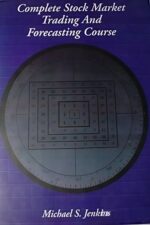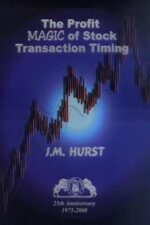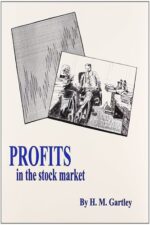Using Technical Analysis: A Step-by-Step Guide to Understanding and Applying Stock Market Charting Techniques
$7.94
In “Using Technical Analysis” author Clifford Pistolese shows average investors how they too can reap the benefits of technical analysis. Well-organized and easy-to-understand, this book explains a variety of approaches to analyzing and interpreting stock market charts.
Introduction:
This book is a guide for the analysis of stock market charts. It explains how to interpret stock price patterns and trends, trading volume, moving averages, accumulation, and distribution information. You’ll learn how to analyze these elements to determine what is happening to the price of a stock, and what might happen next.
It’s not possible for you to know everything that affects the financial fortunes of a company. However, all that is known about a company’s prospects is reflected in the transactions of all the interested parties who buy or sell the company’s stock. A summary of the trading activities of these buyers and sellers is published in the newspapers every day. A chart which presents a history of these trading actions reflects all information about the company. By learning to analyze such charts, you’ll have access to an excellent source of information for making your buy, hold, and sell decisions.
Chapter 1 outlines the importance of developing the ability to analyze stock charts. The analysis of stock price patterns and trends is explained in Chapters 2 through 8. Chapter 9 presents the concept of moving averages and explains their relationship to trendlines. Chapter 10 introduces the concepts of accumulation and distribution and indicates how these relate to stock price trends and patterns. Performing the simulation exercises in these chapters will help you improve your understanding of the concepts presented.
Chapter 11 provides a series of charts for you to interpret. These charts show price patterns, volume of trading, and moving averages. They also give information on accumulation and distribution. Using all the concepts learned in the preceding chapters, you can test your ability to interpret the meaning of each chart. The correct interpretations are presented so you can check the accuracy of your analyses.
Contents:
- The Challenge of the Stock Market
- Uptrends
- Reversal Formations at Tops
- Downtrends
- Reversal Formations at Bottoms
- Continuation and Reversal Formations
- Analyzing Volume
- Making Investment Decisions
- Moving Averages
- Accumulation and Distribution
- Interpreting Technical Indicators
Using Technical Analysis: A Step-by-Step Guide to Understanding and Applying Stock Market Charting Techniques By Clifford Pistolese pdf
| Author(s) | |
|---|---|
| Format | |
| Pages | 316 |
| Publication Year | 1994 |
16 reviews for Using Technical Analysis: A Step-by-Step Guide to Understanding and Applying Stock Market Charting Techniques
Only logged in customers who have purchased this product may leave a review.










Ayla Barton (verified owner) –
Its a nicely written book. It covers the basics of Technical Analysis. It focuses only on the charts, and if you believe you can trade using charts, then this book is for you. It also includes a good number of exercises for you to identify the trends explained in the book.
Quinton Reeves (verified owner) –
I really like this book as it covers the basics and has examples where you have to use what you’ve learned to do the exercises. The reading is pretty dry but I still refer back to the book often when I’m trying to remember what a “double bottom” means or what an “ascending triangle” helps you predict.
Lana Powell (verified owner) –
If you have never read a technical analysis book then I highly recommend this above everything else. For startes it’s barely over 200 pages short, with more than half those pages dedicated to charts. Simply put you only read about 100 pages.
The beauty is those 100 pages are powerful and geared perfectly for the beginner. After reading this book I was bitting at the bit to apply my new knowledge, and no longer regard picking stocks as a crap-shoot.
You CAN educate yourself to financial freedom, and this book will help you do that.
Keaton Cline (verified owner) –
Do not overlook this book because it was published in 1994.It contains features that are useful for beginners in technical analysis.The book contains many example charts in bar form that are realistic in nature showing different buy and sell chart pattern setups. The author also tests the readers grasp of the material by asking them to decide whether a stock is a buy or sell based on the chart presented with answers provided at the end of the book.Another important aspect is the dedication of a separate chapter to volume .The author presents many example charts showing the behavior of volume during chart pattern formation and breakouts. In this chapter he also tests the readers knowledge with many excercises.
As another reviewer mentions , this book is a light read with many charts but in my opinion is well worth it for a beginner who wants to get his first exposure to technical analysis.
Koa Roth (verified owner) –
By far, this is the best book on technical analysis for complete beginners. The exercises are most helpful in drilling the basics into the head of the beginner, and prepares him or her for the next level of book.
I read this as my first book when I began as a stockbroker at Merrill Lynch some 20 years ago. The foundation has helped me achieve a 65-70% success rate in executing winning trades.
Angelica Molina (verified owner) –
good informative book!
Garrett Reilly (verified owner) –
Ditto what everyone else said! 🙂 This is a good basic book on technical analysis. Good writing. Good examples. Educational.
If you are thinking about books by Thomas Bulkowski, forget them. Thomas Bulkowski’s writing is terrible and his books are expensive. Using Technical Analysis by Clifford Pistolese is far better.
Buy this one!
Lina Rivers (verified owner) –
If you really want to get into technical analysis, then this is one of the must haves. It’s by no means exhaustive, but does provide a solid survey of some of the most popular TA techniques, and it’s not as boring to read as most others. This is a great book to take with you on a plane or yacht as it is compact in size (not a tome).
Maci Horton (verified owner) –
I found this book to contain very good basic information to learn to interpret stock charts. It will give you the basic understanding of patterns to watch for, to add to other information you may already be using. With just this information, you aren’t going to get rich, but it is beneficial information to get you started. Some of the information about where to obtain stock charts is outdated. This was written before people used the internet for that. The principals taught by the book are timeless though.
Bear Ellis (verified owner) –
thanks. this book is great
Raelyn Callahan (verified owner) –
Read it and you are still back where you started.
Skyla Weiss (verified owner) –
This book covers the basics of chart reading with clear writing and valuable and instructive exercises. I highly recommend it!
Cassius Kirby (verified owner) –
The exercises and illustrations really helped me understand Technical Analysis. I strongly recommend it.
It is easy to read and understand.
Prince Pham (verified owner) –
This book along with “Getting Started in Technical Analysis” by Jack Schwager complement each other nicely. On their own, I would not recommend them as a sole source of information. Together, they work really well.
You can see how the different authors put more or less weight on specific chart patterns and indicators. It gives you a more objective view of what’s being presented. Also, some of the things that one book doesn’t cover well is covered better in another.
In Jack Schwager’s book, I don’t think he talks about volume once. That’s very surprising, as volume is extremely important when making trading decisions. This book does go into volume quite a bit which helps bring things together.
It’s important to note that both books were written a while ago. This book was written in ’94 (’99 for Schwager’s). Thus, he talks about going to the library, making your own charts, etc — so a bit of information is outdated.
The reason why I like these books better than newer books, is newer books either aren’t detailed enough or attempt to dazzle their readers with new chart patterns that are either overly complex or probably not real chart patterns at all. I feel they do this to update with new “Editions” of their books simply as a reason to sell, you guessed it, revised editions!
Tori Savage (verified owner) –
Excellent book. Gives basic concepts simply without clutter, using charts as illustrations for everything. I highly recommend it.
Bennett Fischer (verified owner) –
Hubby bought it. He says excellent book. Very helpful.